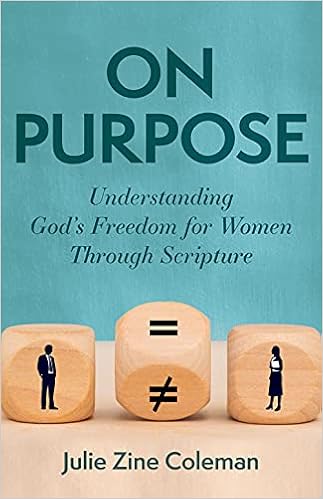by Julie Zine Coleman
“… God sees not as man sees, for man looks at the outward appearance, but the Lord looks at the heart.” 1 Samuel 16:7 NASB
He was a teen in all-out rebellion and dressed the part: longish hair, shredded jeans, and an offensive graphic t-shirt. Even the way he sauntered past my house made a statement. I gave him a friendly wave and a greeting as he passed by.
It wasn’t long before his mom came down the street for a visit. “Did you see my son?” she asked. “I can’t believe how he was dressed. When I told my husband how horrified I was when I saw him walk out the door like that, he just said, ‘Is it sin for him to dress that way? We need to pick our battles with him.’”
Wise words for teenage parents. It became a thing for Steve and I even as we parented our young children. When one gave us pause, we automatically considered: Is it sin? The answer to that question made a difference in our response.
Now that our kids are grown and have children of their own, I’m so glad we had that perspective. Too often, we react to what is culturally different than our standard rather than looking to the heart of the matter. For example, I can remember the horror my church community had at the thought of drums or guitars leading worship in the 70’s. They assumed it to be sin—the beat of drums was satanic—they even had a verse or two to back that belief up.
Rob Parsons, in his book Bringing Home the Prodigals, tells the story of some German Christians that noticed a group of American Christians wearing gold and diamonds. The Germans were so shocked, they dropped their cigars into their beer. What is acceptable in one culture can be unacceptable to another. But culture is culture, and not necessarily sin.
We waste a lot of time and energy pushing back on differences that really don’t matter at all.
What is God’s perspective? In his time on earth, Jesus shocked a lot of traditionalists with how he lived. “Why are you picking grain or healing people on the Sabbath?” they demanded. “How come you do not ceremonially wash your hands before eating? Why would you eat in the company of sinners?”
Mind you, Jesus was not disobeying Mosaic Law, originating from God himself. He was ignoring the Pharisaic Oral Law, human-created in the previous century. Those strict standards and overwhelming restrictions burdened the people of Jesus’ day and kept them in fear of offending God at every turn. It contained rules based on external activities, much more about appearances than what was in the heart (Romans 9:31-33).
But Jesus offered something different: “Come to Me, all who are weary and heavy-laden, and I will give you rest. Take my yoke upon you and learn from Me, for I am gentle and humble in heart, and You will find rest for your souls. For My yoke is easy, and My burden is light” (Matthew 11:28-30 NASB). Even keeping all of the Pharisees’ many rules would not necessarily bring them any closer to God.
Jesus warned a crowd at the temple, “Do not judge according to appearance, but judge with righteous judgment” (John 7:24 NASB). They had been judging Jesus for healing a man on the Sabbath. But they were missing the heart of God revealed in that act of mercy. They’d been distracted by the external.
We will never bring someone to Jesus through rules and being judgmental. But we can win them over with love, by extending grace and mercy. It’s exactly how God won us over, after all. “Freely you received, freely give” (Matthew 10:8 NASB).
Appearances are often a mere reflection of culture. Instead of judging by the superficial, reach for the heart. That perspective will make all the difference.
This article is brought to you by the Advanced Writers and Speakers Association (AWSA).

About the author: Julie Zine Coleman helps others to understand and know an unexpected God. A popular conference and retreat speaker, she holds an M.A. in biblical studies. Julie is the managing editor for Arise Daily. When she is not glaring at her computer, she spends time with her grandchildren, gardening, or crafting. More on Julie can be found at her new website JulieZineColeman.com and Facebook.

Many Christian women are torn between the church’s traditional teachings on gender roles and the liberty they experience in secular society. But what if the church’s conventional interpretations aren’t really biblical at all? Julie’s new book, On Purpose, is a careful study of the passages in the Bible often interpreted to limit women in the church, at home, or in the workplace. Each chapter reveals timeless biblical principles that actually teach freedom, not limitation.
Join the conversation: Have you ever mistakenly judged someone by the external?


Wise and sweet words – love the scripture you referenced ! God bless
LikeLiked by 1 person
Me too! Thanks, Christina.
LikeLike
Such a great reminder to choose the true battles, Julie. Thank you.
LikeLike
Works on so many levels, right? Even adult to adult.
LikeLike
Excellent words, Julie! Thank you for sharing.
LikeLike
My husband and I have volunteered at homeless shelters. We have learned that the outward appearance is not what is found on the inside of many people. Everyone has a unique story. This is a great message Julie.
LikeLike
So true, Melissa. We have to get away from judging a book by its cover and making the effort to find out what’s going on inside. Seriously.
LikeLiked by 1 person
Thank you, Julie. You’ve shared an important reminder that requires lots of wisdom and also knowledge of God’s perspective about the heart’s motives.
LikeLike
Good thing we have the Holy Spirit to help us figure it all out! Remaining sensitive to Him is key to looking beyond the external. Thanks, Kathy!
LikeLike